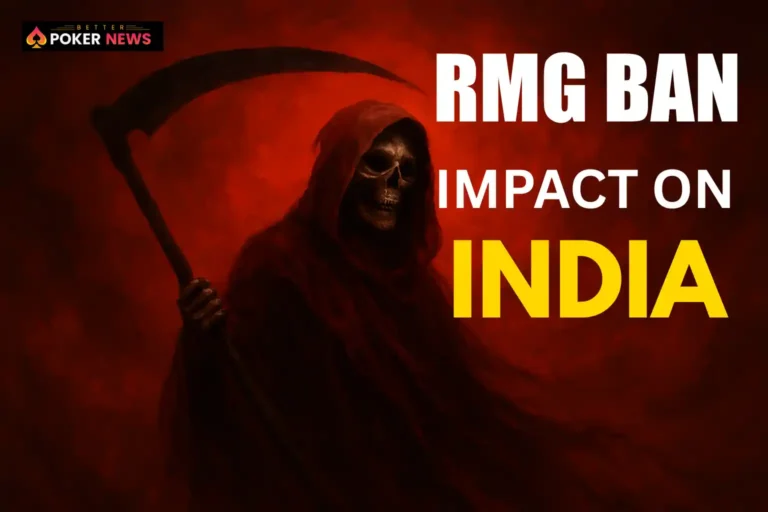The Online Gaming Promotion and Regulation Bill, 2025, has led to heated discussions among politicians and the industry. The proposed draft law — to be introduced in Parliament — suggests an all-out ban on online real-money games (RMG), something that could affect lakhs of jobs, billions in investment, and huge tranches of taxes.
It has been opposed by opposition leaders, industry bodies, and even some state ministers, who have argued that an all-encompassing ban would only drive players underground to unlicensed offshore platforms, while destroying the ecobubble for domestic gaming in India.
Related Read Sri Lanka’s Casino Revolution & India’s Tax Exodus: How South Asia’s Gaming Map Is Changing
How to Play RMG Real Money Games?
Online RMG apps enable players to deposit money for digital games and cash prizes. This includes games of skill such as fantasy sports and rummy, and certain games of chance.
Under the draft Bill:
- All games where players have to pay an entry fee as well as deposit money for a contest will be classified as “Online money game.”
- It will become illegal to provide, advertise, or process payments for such games.
- Banks and payment companies will likewise be prohibited from carrying out RMG transactions.
E-Sports and Social Games are safe.
E-sports and online social games, in which players don’t win cash, are specifically exempted from the legislation.
The likes of BGMI, PUBG, League of Legends, and Call of Duty already come under the exempted list, Motilal said, adding new authorities are expected to promote and regulate e-sports in India.
Who Will Be Affected?
Here are some of the leading RMG platforms that the ban could affect in India:
- Dream11
- My11Circle
- Khelo Fantasy Live
- WinZO
- Games24x7
- Junglee Games
More than 200,000 people are employed by the collective, and over ₹25,000 crore have been invested by foreign companies in the unit space. It also pays ₹20,000 crore every year in GST, a sizeable component of India’s digital economy.
Opposition Worries: Jobs, Revenue, and Regulation
Stakeholders say a total prohibition could adversely affect the nation’s economic outlook:
- Congress MP, Karti Chidambaram, stated that the Bill would be a “knee-jerk reaction” and jobs to sell would go offshore, whereas 400,000 jobs would be lost and investments of $6 billion would go up in smoke.
- Priyanka Chaturvedi (Shiv Sena UBT MP) slammed companies for taking advantage of the loopholes, opening offices in foreign countries, and cashing in on celebrity endorsements.
- Priyank Kharge (Karnataka Minister): Prohibition will not only push users to unregulated offshore platforms, but repeat the lessons of the 28% GST on online gaming introduced in 2023.
In summary, although all parties agreed that regulation is in order, many felt that a ban of any sort would gut the domestic industry while empowering international operators and undermining the objectives of financial sovereignty and consumer protection.
Penalties Under the Draft Bill
The plan also includes stiff penalties to ensure the ban is enforced:
- Three years in jail and ₹1 crore fines for hosting online money games.
- Up to two years of jail term and ₹50 lakh fines for promoting these games.
The Bill also bans advertisements connected with RMG, thus narrowing the visibility and reach of such platforms.
Why Does the Government Want This?
Officials have voiced concerns about gaming addiction among young people, financial losses, and mental health. Some states, such as Tamil Nadu, have already imposed curbs on money-based games, paving the way for a national framework.
But detractors say an even regulatory hand, as opposed to outright prohibition, would:
- Protect citizens from gaming-related harms.
- Keep jobs and investments in India.
- Protect taxes that can aid the digital economy.
Tax Pressures on RMG Companies
Already, the GST duty on RMG firms is huge:
28% GST on deposits
Section 115BBJ – windfall between flat 30% and the rates in force for other persons, 30% flat tax on prize money.
Now there is speculation that the government could hike the GST to 40% and have RMG brought under “sin goods” like tobacco and alcohol. This blanket approach to taxation fails to differentiate between games that require skill and those that rely entirely on chance – a key issue for operators.
What Happens Next?
There will be a bill, the Online Gaming Bill 2025, soon in Parliament. Meanwhile, industry captains are pressing for talks with the Home Ministry and pleading for regulation rather than prohibition.
The result of this legislation is likely to determine the future of India’s RMG sector, its employment market, and where it stands in the global digital gaming landscape.
Sources:
- Business Standard: Explainer – Online real-money games and the proposed ban
- TeamG2G: Online Gaming Bill 2025 sparks political row


3 Comments
Pingback: 5 Types of Poker Players You Meet at Every Home Game
Pingback: India’s Real-Money Gaming (RMG) Ban 2025: Industry Impact, Poker Player Guide & Southeast Asia Options
Pingback: India’s Online Gaming Ban 2025: A23 Files First Major Legal Challenge